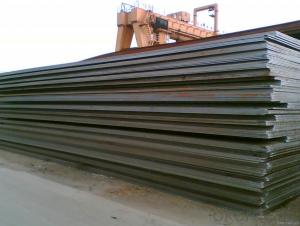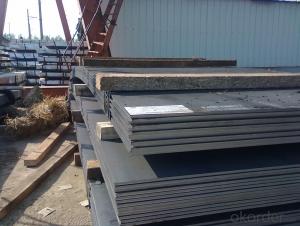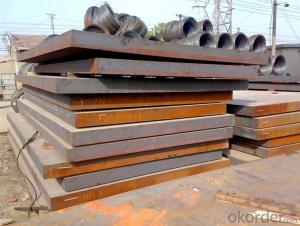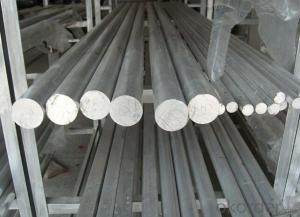Hot Rolled Mild Steel Plate JIS SS400 Carbon Steel Sheet
- Loading Port:
- China main port
- Payment Terms:
- TT or LC
- Min Order Qty:
- 25 m.t.
- Supply Capability:
- 10000 m.t./month
OKorder Service Pledge
OKorder Financial Service
You Might Also Like
Item specifice
Steel sheet, steel plate, mild steel sheet, carbon steel sheet
Size | Thickness:2.0-200mm |
Application | Steel plates are widly used as boiler plate, container plate, flange plate and ship plate, and also widly used in building construction. The size of steel plate can be made according to clients requirements. |
Packing | In bulk or as required |
| Delivery time | Within 10-25 days after order confirmed and L/C received |
Workshop Show
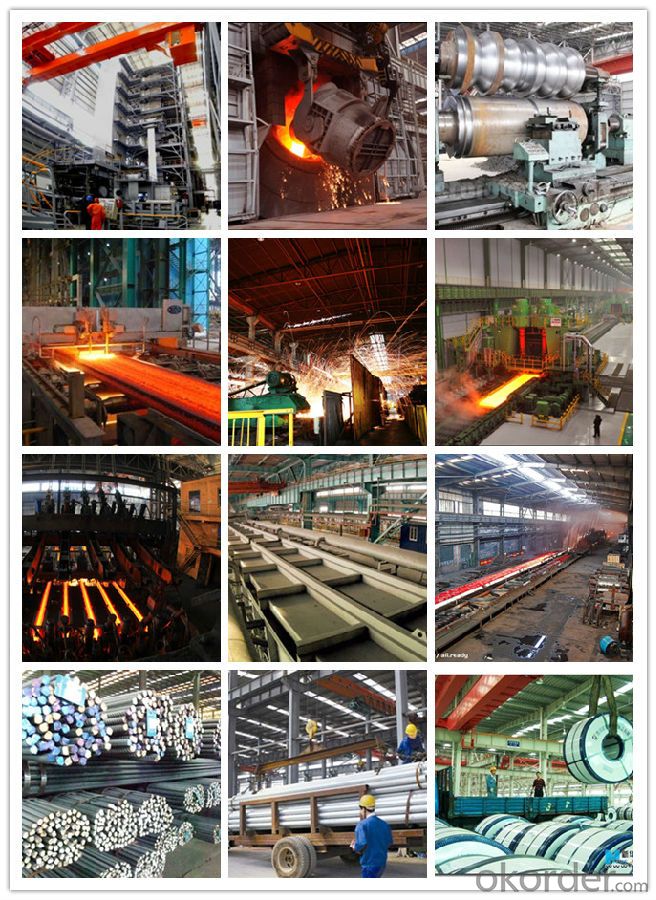
Shipping
1. FedEx/DHL/UPS/TNT for samples, Door-to-Door;
2. By Air or by Sea for batch goods, for FCL; Airport/ Port receiving;
3. Customers specifying freight forwarders or negotiable shipping methods!
Delivery Time: 3-7 days for samples; 5-25 days for batch goods.
Package Informations
1) EXPORT, In 20 feet (GW 25 ton) or 40 feet Container (GW 25 ton)
2)as customer's requirement
Why choose us?
(1) The leading exporter in China special steel industry.
(2) Large stocks for various sizes, fast delivery date.
(3) Good business relationship with China famous factories.
(4) More than 7 years steel exporting experience.
(5) Good after-sales service guarantee.
- Q:How does special steel contribute to reducing product costs?
- Special steel contributes to reducing product costs in several ways. Firstly, special steel is known for its high strength and durability, which allows manufacturers to design and produce products that have a longer lifespan. This reduces the need for frequent replacements or repairs, thus saving costs in the long run. Additionally, special steel can be customized to meet specific requirements, allowing for the production of lighter and more efficient products. This can lead to savings in terms of raw material usage, transportation costs, and energy consumption. Moreover, special steel often has excellent corrosion resistance, reducing the need for additional protective coatings or maintenance, which can also result in cost savings. Overall, the utilization of special steel in manufacturing processes helps optimize product performance, longevity, and efficiency, thereby contributing to reducing product costs.
- Q:Can special steel be used in cryogenic applications?
- Yes, special steel can be used in cryogenic applications. Special steels, such as stainless steels, are known for their excellent resistance to low temperatures and can maintain their mechanical properties even at extremely cold temperatures. This makes them suitable for use in cryogenic applications where materials need to withstand and perform well in extreme cold environments.
- Q:What are the properties of wear-resistant tool steel?
- Wear-resistant tool steel typically possesses high hardness, excellent toughness, and good resistance to abrasion, corrosion, and deformation. It is capable of maintaining its cutting edge for extended periods, making it ideal for applications where tools are subjected to high wear and friction. Additionally, wear-resistant tool steel often exhibits good heat resistance, ensuring stability and performance even under high temperatures.
- Q:How does special steel contribute to the renewable energy industry?
- Special steel contributes to the renewable energy industry by enabling the development and growth of various renewable energy technologies. Its exceptional strength, durability, and resistance to corrosion make it an essential material for manufacturing wind turbines, solar panels, and hydroelectric power plants. Special steel components withstand the harsh environmental conditions in these renewable energy systems, ensuring their reliability and longevity. Additionally, special steel's high magnetic permeability is crucial for the construction of transformers and generators, essential components in renewable energy infrastructure. In summary, special steel plays a vital role in supporting the renewable energy industry's expansion and sustainability.
- Q:What are the main advantages of using special steel in the food processing industry?
- The main advantages of using special steel in the food processing industry are its high corrosion resistance, durability, and hygienic properties. Special steel is resistant to rust and corrosion, ensuring that it does not contaminate the food being processed. It also possesses excellent strength and durability, making it suitable for handling heavy loads and withstanding harsh operating conditions. Furthermore, special steel is easy to clean and maintain, promoting a higher level of hygiene in food processing facilities.
- Q:How is special steel used in the aerospace industry?
- Special steel is used in the aerospace industry for various applications, including the manufacturing of critical components such as jet engines, landing gear, and airframe structures. Due to its exceptional strength, corrosion resistance, and heat resistance properties, special steel ensures the safety, durability, and performance of aircraft while operating under extreme conditions.
- Q:What are the different methods of surface finishing for special steel?
- Special steel can be finished using various methods, each with its own advantages and the ability to meet specific aesthetic or functional needs. Some commonly utilized techniques include: 1. Electroplating: Through an electrochemical reaction, a layer of metal is deposited onto the surface of the special steel. This process enhances corrosion resistance, improves appearance, and can increase hardness or wear resistance. 2. Passivation: A chemical treatment is employed to eliminate surface contaminants and form a thin oxide layer on the special steel. This treatment enhances corrosion resistance by preventing rust or other oxidation products from forming. 3. Polishing: Utilizing abrasive materials, a mechanical process is employed to remove a thin layer of the steel surface, resulting in a smooth and glossy finish. This method is often used to enhance the appearance of special steel products or achieve a desired level of reflectivity. 4. Shot blasting: Tiny metal beads or shots are propelled at high speeds onto the surface of the special steel. This technique removes scale, rust, or other surface contaminants, resulting in a clean and textured finish. Shot blasting is commonly employed to prepare the steel for subsequent coating or painting applications. 5. Physical vapor deposition (PVD): A vacuum-based coating process is used to deposit a thin layer of material onto the special steel surface. This method offers excellent adhesion, wear resistance, and the ability to provide various colors or finishes to enhance the steel's aesthetics. 6. Powder coating: Dry powder is applied onto the special steel surface and then cured under heat to form a protective and decorative layer. This method offers excellent corrosion resistance, durability, and a wide range of color options. 7. Anodizing: An electrolytic process is employed to create a controlled oxide layer on the surface of specific special steel alloys. This process increases corrosion resistance, improves appearance, and can enhance hardness or wear resistance. These methods are just a selection of the numerous options available for surface finishing special steel. The choice of method will depend on factors such as the desired finish, functional requirements, and the specific properties of the steel being used.
- Q:What are the different methods of preventing stress relaxation in special steel?
- Preventing stress relaxation in special steel can be achieved through various methods. One effective approach is the utilization of heat treatment, specifically by employing the annealing process. Annealing consists of heating the steel to a specific temperature and gradually cooling it down. This technique successfully alleviates internal stresses within the steel, thus preventing stress relaxation. Another effective method involves employing stress relieving techniques. These techniques necessitate the controlled application of stress to the steel, typically through cold working or mechanical deformation. By doing so, the steel can effectively release any accumulated stress and avoid relaxation over time. Furthermore, incorporating alloying elements into the steel can also aid in preventing stress relaxation. Certain alloying elements, such as molybdenum and chromium, enhance the steel's strength and stability, thereby improving its resistance to stress relaxation. Lastly, meticulous design and engineering of components also contribute to the prevention of stress relaxation. Engineers can minimize the risk of stress relaxation in special steel applications by considering factors such as load distribution, material thickness, and stress concentration points. In conclusion, a combination of heat treatment, stress relieving techniques, alloying elements, and thoughtful design can be employed to effectively prevent stress relaxation in special steel.
- Q:What are the challenges in manufacturing special steel?
- One major challenge in manufacturing special steel is the complex and precise process involved. Special steel requires specific chemical compositions and mechanical properties, which can be difficult to achieve consistently. Additionally, the production of special steel often involves sophisticated technologies, such as vacuum melting or controlled atmosphere furnaces, which require advanced skills and specialized equipment. Furthermore, meeting the stringent quality standards and tolerances of special steel can be demanding, as any deviation can lead to rejected batches. Overall, the challenges lie in maintaining consistent quality, meeting strict specifications, and effectively utilizing advanced manufacturing techniques.
1. Manufacturer Overview |
|
|---|---|
| Location | |
| Year Established | |
| Annual Output Value | |
| Main Markets | |
| Company Certifications | |
2. Manufacturer Certificates |
|
|---|---|
| a) Certification Name | |
| Range | |
| Reference | |
| Validity Period | |
3. Manufacturer Capability |
|
|---|---|
| a)Trade Capacity | |
| Nearest Port | |
| Export Percentage | |
| No.of Employees in Trade Department | |
| Language Spoken: | |
| b)Factory Information | |
| Factory Size: | |
| No. of Production Lines | |
| Contract Manufacturing | |
| Product Price Range | |
Send your message to us
Hot Rolled Mild Steel Plate JIS SS400 Carbon Steel Sheet
- Loading Port:
- China main port
- Payment Terms:
- TT or LC
- Min Order Qty:
- 25 m.t.
- Supply Capability:
- 10000 m.t./month
OKorder Service Pledge
OKorder Financial Service
Similar products
New products
Hot products
Hot Searches
Related keywords
